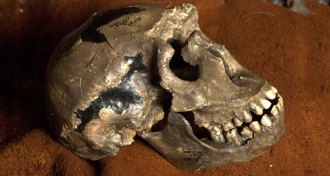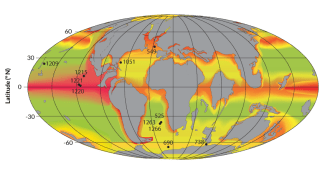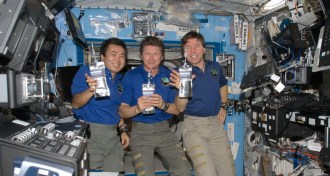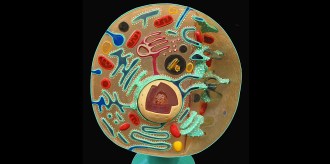All Stories
-
 Climate
ClimateReef fish act drunk in carbon dioxide–rich ocean waters
In first test in the wild, fish near reefs that bubble with CO2 lose fear of predators’ scent.
By Meghan Rosen -
 Oceans
OceansThe surprising life of a piece of sunken wood
Timber and trees that wash out to sea and sink to the bottom of the ocean hold a diverse community of organisms.
-
 Anthropology
AnthropologyTurkana Boy sparks row over Homo erectus height
Estimating the adult height and weight of an ancient youth from his skeleton has proven tricky.
By Bruce Bower -
 Climate
ClimateOcean bacteria may have shut off ancient global warming
Ocean-dwelling bacteria may have helped end global warming 56 million years ago by gobbling up carbon from the CO2-laden atmosphere.
-
 Health & Medicine
Health & MedicineHepatitis C treatment appears extremely effective
A mix of four medications has provided the most effective way to date to counter the hepatitis C virus in humans.
-
 Climate
ClimateIPCC calls for swift switch to alternative power
Rapid adoption of green power production will be necessary to avert a climate crisis, latest IPCC report says.
By Beth Mole -
 Quantum Physics
Quantum PhysicsQuantum experts discuss the measurement problem: A transcript from 1994
A fairly complete transcript of a discussion about quantum physics on May 19, 1994, the last day of a workshop in Santa Fe, N.M., evolves into a more general discussion of the interpretation of quantum mechanics and the quantum measurement problem.
-
 Astronomy
AstronomyEarly Mars couldn’t hold liquid water long
Small rocks hit Mars 3.6 billion years ago, suggesting an early atmosphere too thin for liquid water to hang around very long.
-
 Chemistry
ChemistryHow urine will get us to Mars
A new recycling system turns pee into drinking water and energy, a small step toward really long-term space travel.
-
 Particle Physics
Particle PhysicsExotic particle packs a foursome of quarks
Tetraquarks could help physicists understand the universe’s first generations of matter.
By Andrew Grant -
 Life
LifeHow cells keep from popping
The protein SWELL1 stops cells from swelling so much that they burst, a new study shows.
-
 Animals
AnimalsLionfish grow wary after culling
Efforts to control invasive lionfish could make them more difficult to catch.